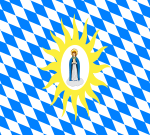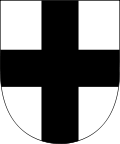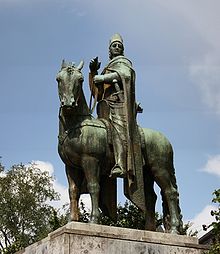- List of bishops and archbishops of Cologne
-
Contents
Bishops and Archbishops of Cologne
Bishops of Colonia Agrippina, 88–784
History
Culture
Mayors
Demographics
Districts
TransportAll names before Maternus ('II') are to be approached with considerable scepticism since no contemporary evidence is available. Maternus was present at a council in Rome in 313. The bishops between Severinus and Charentius are also apocryphal. Domitianus was bishop of Maastricht (Mosa Traiectum). The given dates of office before bishop Gunther are also conjectural at best.
- Maternus I c. 88–128
- Paulinus
- Marcellinus ?
- Aquilinus
- Levoldus ? c. 248–285
- Maternus II c. 285–315
- Euphrates c. 315–348
- Severinus c. 348–403
- Ebergisil I ? c. 403–440
- Solatius c. 440–470
- Sunnovaeus c. 470–500
- Domitianus fl. c. 535
- Charentinus fl. c. 570
- Eberigisil II ? c. 580–600 ?
- Remedius c. 600 ? –611 ?
- Solatius c. 611 ? –622
- Cunibert c. 623–663
- Bodatus c. 663–674
- Stephen 674–680
- Adelwin 680–695
- Giso 695–708
- Anno I 708–710
- Faramund 710–713
- Agilolf 713–717
- Reginfried 718–747
- Hildegar 747–753
- Bertholm 753–763
- Rikulf 763–784
Archbishops of Cologne, 784–1238
- Hildebold 784–818
- Hadbold 818–842
- Hildwin 842–849
- Günther 850–864
- Hugo Welf 864
- Wilbert 870–889
- Hermann I 890–924
- Wigfried 924–953
- Bruno I 953–965
- Volkmar 965–969
- Gero 969–976
- Warin 976–984
- Ebergar 984–999
- Heribert 999–1021
- Pilgrim 1021–1036
- Hermann II 1036–1056
- Anno II 1056–1075
- Hildholf 1076–1078
- Sigwin 1078–1089
- Hermann III 1089–1099
- Friedrich I 1100–1131
- Bruno II von Berg 1131–1137
- Hugo von Sponheim 1137
- Arnold I 1138–1151
- Arnold II von Wied 1152–1156
- Friedrich II von Berg 1156–1158, nephew of Bruno II von Berg above
- Rainald of Dassel 1159–1167
- Philipp von Heinsberg 1167–1191, he gained the title of Duke of Westphalia and Angria in 1180, from then on held in personal union by all incumbents of the Cologne see until 1803.
- Bruno III von Berg 1191–1192, brother of Friedrich II above
- Adolf I von Berg 1192–1205, nephew of Bruno III above
- Bruno IV von Sayn 1205–1208 (in opposition)
- Dietrich I von Hengebach 1208–1215 (in opposition)
- Engelbert II von Berg 1216–1225, nephew of Bruno III above
- Heinrich I von Mulnarken 1225–1237
Archbishop-Electors of Cologne, 1238–1803
Further information: Electorate of CologneImage Name From To Notes Konrad von Hochstaden 1238 1261 Engelbert II von Falkenstein 1261 1274 Siegfried II of Westerburg 1274 1297 Wikbold I von Holte 1297 1304 Heinrich II von Virneburg 1304 1332 Walram von Jülich 1332 1349 Wilhelm von Gennep 1349 1362 First Elector of Cologne under the Golden Bull of 1356 Adolf II von der Marck 1363 1363 Engelbert III von der Marck 1364 1369 Kuno von Falkenstein 1370 1371 Friedrich III von Saarwerden 1372 1414 Dietrich II von Moers 1414 1463 Ruprecht of the Palatinate 1463 1480 
Hermann IV of Hesse 1480 1508 Philip II of Daun-Oberstein 1508 1515 
Hermann V von Wied 1515 1546 Sought to reform religious practice in the Electorate; converted to Protestantism; deposed and excommunicated. Adolf III of Schauenburg 1546 1556 Anton of Schauenburg 1556 1558 Gebhard I von Mansfeld-Vorderort 1558 1562 A founding member of the Schmalkaldic League Friedrich IV of Wied 1562 1567  ⋅
⋅Salentin von Isenburg-Grenzau 1567 1577 Upon the deaths of his younger and older brothers, there were no more brothers to carry on the family name; he left Church administration in 1577, married, had two sons, and conducted a successful military career. He died in 1610. 
Gebhard II Truchsess von Waldburg 1577 1583 Converted to Calvinism in 1582; married Agnes von Mansfeld-Eisleben (cousin once removed of the archbishop and Prince-Elector Gebhard I von Mansfeld-Vorderort); Competing archbishop elected;Cologne War war decides the outcome. 
Ernest of Bavaria 1583 1612 Brother of William V, Duke of Bavaria; Papal Nunciate established permanently in Cologne. 
Ferdinand of Bavaria 1612 1650 Brother of Maximilian I, Elector of Bavaria, nephew of Ernest of Bavaria. Principle of Secundogeniture. 
Maximilian Henry of Bavaria 1650 1688 First cousin of Ferdinand Maria, Elector of Bavaria 
Joseph Clemens of Bavaria 1688 1723 Brother of Maximilian II Emanuel, Elector of Bavaria. Put under Imperial ban for siding with France in the War of the Spanish Succession. 
Clemens Augustus I of Bavaria 1723 1761 Brother of Charles, Elector of Bavaria and Emperor. Last Wittelsbach to hold the office. 
Maximilian Frederick of Königsegg-Rothenfels 1761 1784 
Maximilian Franz of Austria 1784 1801 The electorate's left-bank territories were seized and annexed by France in 1795 
Anton Viktor of Austria 1801 1803 The electorate's remaining territories were secularized and given to the Landgrave of Hesse-Darmstadt in 1803. Modern Archbishops of Cologne, 1824 to date
- Ferdinand August von Spiegel 1824–1835
- Clemens August II Droste zu Fischering 1835–1845
- Johannes von Geissel 1845–1864
- Paul Melchers 1866–1885
- Philipp Krementz 1885–1899
- Anton Hubert Fischer 1902–1912
- Felix von Hartmann 1912–1919
- Karl Joseph Schulte 1920–1941
- Josef Frings 1942–1969
- Joseph Höffner 1969–1987
- Joachim Meisner 1988–present
External links
- (German) List of Bishops and Archbishops of Cologne Archdiocese of Cologne (Erzbistum Köln)
- (English) List of Bishops and Archbishops of Cologne Cologne Cathedral (Kölner Dom)
Links to related articles  Members of the Electoral College of the Holy Roman Empire following the Golden Bull of 1356Added from 1803–06
Members of the Electoral College of the Holy Roman Empire following the Golden Bull of 1356Added from 1803–06 Prince of Regensburg
Prince of Regensburg
 Grand Duke of Salzburg (1803–05)
Grand Duke of Salzburg (1803–05)
 Grand Duke of Würzburg (1805–06)
Grand Duke of Würzburg (1805–06)
 Duke of Württemberg
Duke of Württemberg
 Margrave of Baden
Margrave of Baden
 Landgrave of Hesse-Kassel
Landgrave of Hesse-KasselCatholic League (1609–35) within the  Holy Roman Empire
Holy Roman Empire Categories:
Categories:- Archbishops of Cologne
- Lists of bishops and archbishops
- Germany-related lists
- Cologne-related lists
Wikimedia Foundation. 2010.


